For the people running Davaam, the biggest problem is how to most efficiently market themselves. For once, we are sympathetic to their plight, because in the same store this one company sells both solar panels and shampoo. An energy services company and a sustainable lifestyle store, Davaam has dipped its fingers in everything that might help make a sustainable world and secure the future of planet earth.
They sell energy solutions like rooftop solar panels and energy efficient solutions. At the same time, they have a waste management service, as well as a lifestyle store that sells everything from shampoo to chia seeds. Despite their big ambitions and tireless commitment, they are a very small operation, and one that on the surface seems to be biting off more than it can chew.
Recently, however, this cross between an engineering firm and a lifestyle brand has produced a product that might very quickly be integral in reducing plastic waste from the country.
As a company whose core ethos is based on sustainability, Davaam understands how important it is to tackle the plastic waste management problem. Davaam has recently launched a refilling machine in their store in Karachi where customers can bring their shampoo bottles and refill them at a discounted price. Now, Davaam is a very small lifestyle brand, so this serves little purpose on a larger scale. But since Davaam is also an engineering company, the implications of the technology they have developed themselves to create these refilling stations are much more.
For the past few years, Unilever has been claiming they are preparing to launch refilling machines in Pakistan as well. And according to sources, they have shown interest in the design that Davaam has produced. And since Unilever is the largest FMCG company in Pakistan, other MNCs and FMCGs might also follow suit or have to follow suit in installing refilling machines, both saving customers money and reducing overall waste in Pakistan. And if that does happen, companies will prefer using the locally made machines rather than importing expensive ones from abroad that also do not fit their specifications.
Cornerstone: Sustainability
“Perfectly fine, sturdy material that could have been reused was thrown in the trash which most of the time just ended up in the landfill. We keep buying bottles every month, paying extra for it and discarding them. Our idea was to create a mechanism where people can reuse their bottles and just pay for the product rather than the packaging every time,” explains Salman Tariq, Co-founder & CEO of Davaam. Along with his co-founder and Managing Director Omar Ghaznavi, Salman has spent a career trying to minimise and curtail waste.
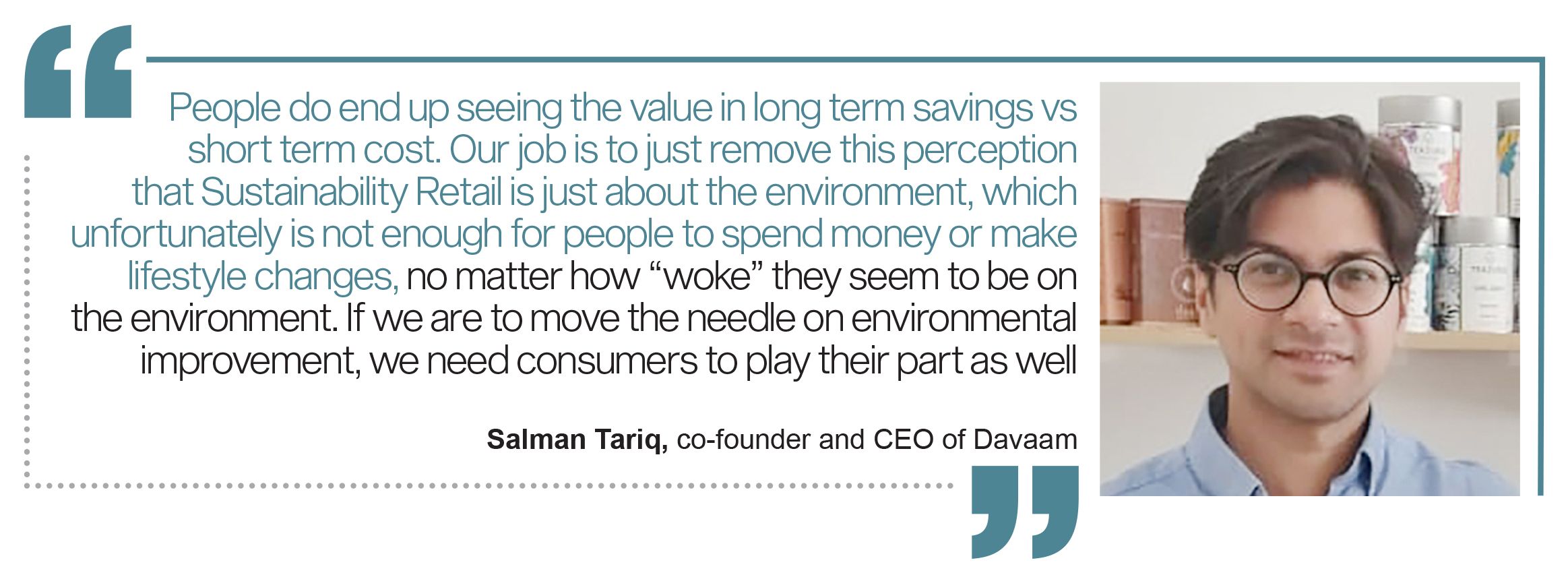
“Both Omer and I worked together in KESC 10 years back where we started looking at clean energy projects and particularly Waste-to-Energy. One of the projects was in bhains colony (landhi cattle colony) really became an integral part of our lives. The environmental catastrophe of 3,000 tons per day of manure, which was flushed out of the farms, flowed as brown streams, rivers, waterfalls and finally found its way to the sea – everyday! We worked on this for a good four to five years, trying to create one of the largest biogas plants of its kind. While it succumbed to the usual multi-faceted stakeholder problems, we exited with immense knowledge and passion for creating opportunities out of wasted resources.”
This is where the inspiration for Davaam comes from. The idea has been to create circular economy initiatives in order to manage wastage in society. “Without realizing we waste a lot of energy, we create a lot of trash and end up burning a lot of money trying to fix things. We help consumers to become more energy efficient, adapt clean energy resources, and produce less trash footprint.”
But Davaam had a problem. Their entire company was based on the idea that they were helping reduce waste for other companies and providing environmentally sustainable solutions. At the same time, their lifestyle brand was producing the same kind of waste they were trying to help others cut down on. This is why they decided they needed a refilling plant.
“There is an opportunity to save 15-20% of our costs on these personal care products if we just refill. Since we were opening our “sustainability retail” store that displays clean tech, we thought this would also be a good place to reduce waste by encouraging refills and minimal packaging, especially personal care products like shampoos and liquid soaps,” explains Salman. “We initially started looking for ready-made machines but we couldn’t find exactly what we wanted. What we found was either extremely expensive to bring to Pakistan and would not allow the concept to be scalable. Moreover, all supply chains had been shuttered because of the pandemic.”
With the deck stacked against them, Davaam decided they would stop looking for machines and use their considerable engineering resources to build the machines themselves. “Our own in-house engineers and design team stepped up and created this machine,” says Salman, saying they are constantly looking to improve the technology. For now the team has made only one prototype but are looking into ways to improve on newer versions and upgrades. The parts for the machine are all locally accessible making the machine feasible not only from a price point but also through a supply point of view. Currently, they have the machine on display to dispense shampoo, and will soon have it ready to also be able to dispense products with the viscosity of oils.
This journey behind how they created their own machines is why Davaam is worth looking at. If this were just some company that decided to import a ridiculously expensive machine for their own products then it would not have been a big deal, since they have a relatively small clientele for their own products. But what can happen now is larger companies using their machines and paying them for it. This is something Davaam is well aware of and have already worked out a business model for, with Salman telling Profit that they will not be selling the machines, and will instead opt for a service based model in which they will rent the nozzle and will provide maintenance for the machinery.
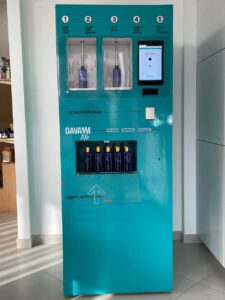
Already, the machinery has gotten its first customers in a way, with Davaam partnering with CoNatural, a natural and organic skin and hair care brand founded by Myra Qureshi and Reema Taseer in 2014. It is the first brand to jump the automated refill station bandwagon in Pakistan. You can now refill your bottle of CoNatural conditioner at the refill machine located in Davaam’s retail store. To create hype, Davaam and CoNatural both partnered to give out free refills to clients in order to raise awareness about the refill station in addition to the shampoo.
While this is a business decision, it is important to note that CoNatural has the first mover’s advantage when it comes to these refill stations and can also use this as an opportunity to further its image of being conscious of its environmental footprint. This in itself is a big PR move, especially for their clientele or potential customers that prefer sustainable brands with smaller carbon footprints.
The FMCG question
Up until now, what is clear is that Davaam has serious business potential providing services to customers like CoNatural that boast environmentally friendly products. In fact, once these services become more common knowledge, any eco friendly brand worth its salt will have to consider it. But the other question is how much of an impact this technology can have on Pakistan’s waste management problem and in breaking the culture of plastic bottles as packaging. This is very heavily dependable on whether or not they can snag a big fish, and their eyes should be set on an FMCG like Unilever.
In 2019, Unilever announced that they’re working on ways to reduce the impact of plastic packaging so that shoppers can buy one plastic container and refill it over and over again. Nearly two years later, Unilever joined the refill game by launching their first refill station at Carrefour located in Dolmen City Mall, Karachi. Now, we do not have details about their machinery but it is imported and not sourced from Davaam. What we do know however is that Unilever is aware of Davaam and likes what they see, so if this experiment at Dolmen Mall in Karachi goes well, there might be the possibility of them wanting to expand refilling stations elsewhere in the city and beyond.
This is Unilever’s pilot run for this initiative which goes in line with their global commitment to reduce plastic. The brand has committed to recycle more plastic than they use by the year 2025. This is one of steps that Unilever is implementing amongst many others in order to achieve that goal. “Consumers are encouraged to bring in any plastic shampoo bottle to the SSK refill station. In exchange for these bottles, they can buy personalized Sunsilk refillable bottles at Rs 20 discount. For shampoo purchase in the future, they bring back their Sunsilk bottle and get shampoo refilled. The plastic that is saved from this initiative will be used to build benches for parks and schools,” explains Hussain Ali Talib, senior manager corporate affairs at Unilever. “If they don’t bring any bottle, they can purchase at the normal price without discounts and with the pledge to save plastic from their next purchase.”
“It is a one-push automated machine. Preferably it will be operated by the brand ambassador due to SOPs, but otherwise the consumers also have the option to push the button. A weighing gram is built in the machine which displays the grammage of the bottle. We only have the option of 185 ml as of now.”
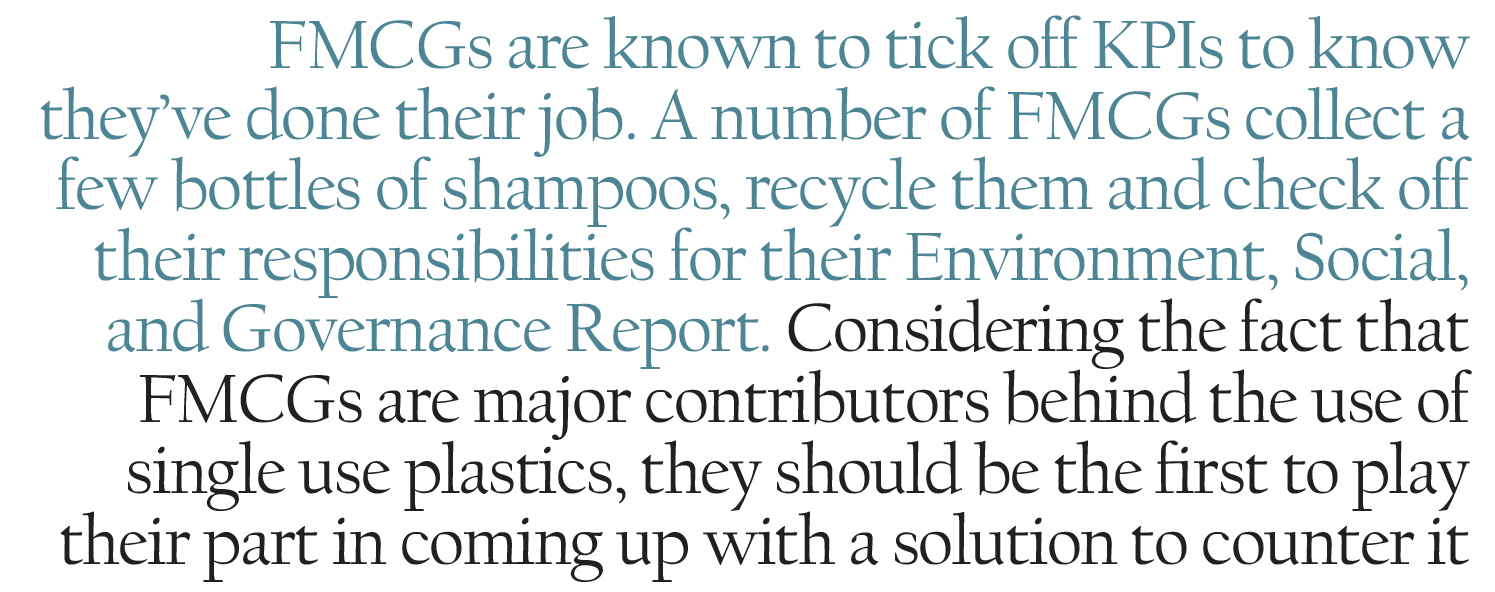
All of this sounds good. From an environmental perspective, it is not enough. What we need is government legislation that makes it compulsory for people to only buy one bottle and keep refilling it. As long as consumers have options of convenience to buy in bulk, they will not bother with remembering to carry their empty shampoo bottles with them on grocery runs no matter how many times corporations encourage them. Customers will not sacrifice their convenience for a Rs 20 discount. Either the discount has to be big enough for this campaign to be successful, the government needs to intervene on an emergency basis for the sake of the environment and implement taxes on producing plastics, or there needs to be an effective awareness campaign.
The odds are against this one refilling station by Unilever in one mall becoming a massive success and spreading to other parts of the city let alone the country. If it does somehow happen, however, there is the very high possibility that other FMCGs will have to jump aboard the refilling ship, and if that happens, it might be game on.
Will other FMCGs hop on board? Even if they do, the fear is that they might only be doing so for cosmetic purposes. Even with Unilever, they have not invested heavily into promoting refilling stations. But by putting this one up, they will be able to check a box and claim they are environmentally friendly, even though that requires a lot more work, particularly since these FMCGs are the ones causing most of the damage.
FMCGs are known to tick off KPIs to know they’ve done their job. A number of FMCGs collect a few bottles of shampoos, recycle them and check off their responsibilities for their Environment, Social, and Governance Report.
According to Salman Tariq, considering the fact that FMCGs are major contributors behind the use of single use plastics, they should be the first to play their part in coming up with a solution to counter it. “The large FMCGs are responsible for wreaking havoc with the environment. The top 10 polluters every year are these big name FMCGs; now that we have shown the way and created a locally built solution, we expect these companies to join hands in scaling up the idea.
“They have the reach, the products, and the relationships with retailers. They know their customers. Together we can make a tectonic shift in the way consumers buy things.”
When asked about how he sees his refill stations achieving scale, Tariq says that it will only be possible once FMCGs take this concept seriously. Moreover, possible avenues could also result in refilling stations becoming a norm at all supermarkets. “Scale will be achieved when these large FMCGs think of this as more than a cosmetic “sustainability” check mark and a PR stunt. We really need to make this the new normal which can be done if our refill station is present in every retail store and if this refilling option is there for multiple products.”
The sachet economy
A sachet economy is one where consumers buy products such as shampoo, detergent, powdered milk, and masalas in single use packages called sachets. These are often found in poorer countries where the purchasing power of a large number of people remains weak. This encourages consumption of small units of product for consumers that are not able to save a lot or face irregular income. Such consumers are unable to buy in bulk and purchase smaller units or amounts in the form of sachets.
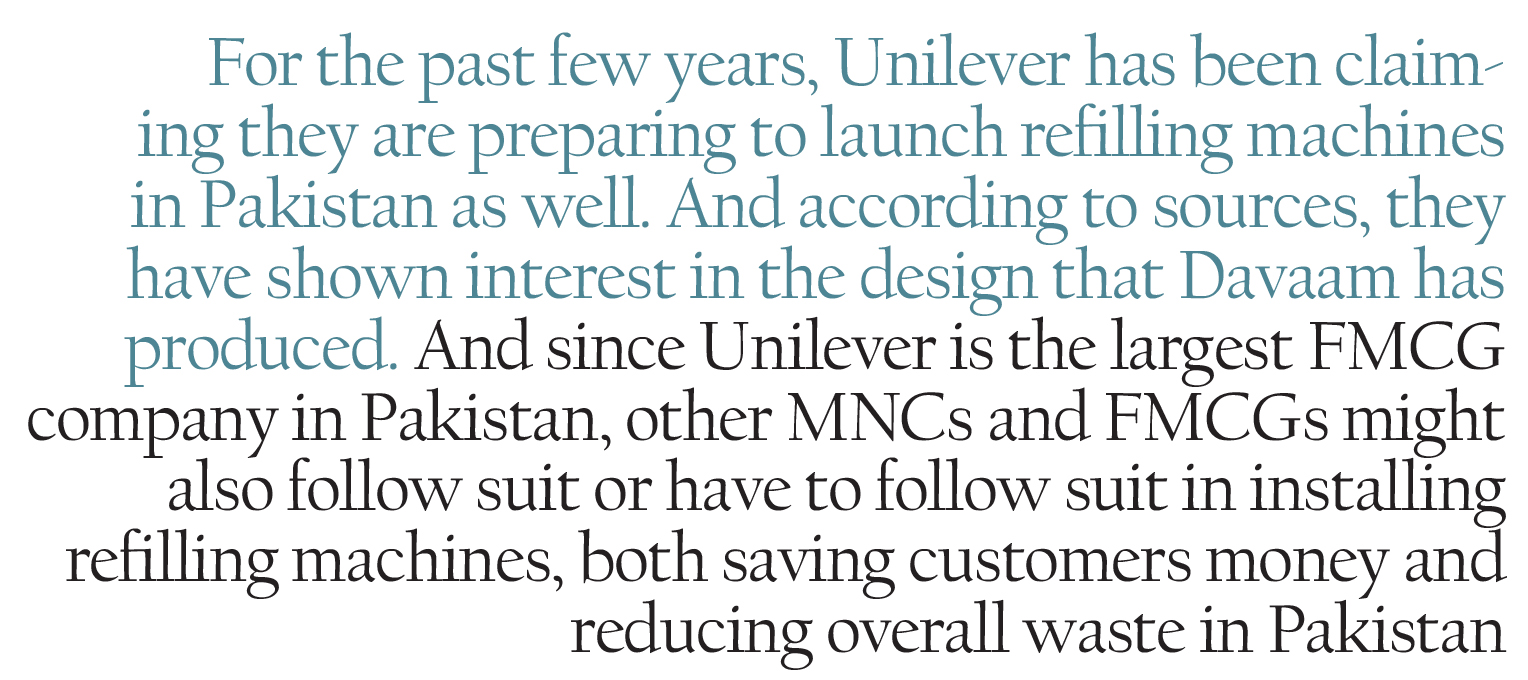
The prevalence of this economy whilst on one hand reduces the barriers to economic participation of those that would have been excluded from buying larger quantities, is often criticized for its impact on the economy. These sachets are usually plastic and often end up as litter which can lead to drain blockage in some cases.
While designing biodegradable packaging is a solution, it is not one that all companies can afford, or all products can withhold. As a result, exploring various alternatives is the need of the hour.Refill stations are one way to reduce the economic barriers of letting lower income consumers using a product, whilst bringing down the impact on the environment.
It is also important to note that if you go into any local grocery market such as Water Pump, Gol Market, or Jodia Bazar, you’ll often find sellers refilling oil cans. This is a traditional form of refilling stations where consumers pay for the grams they buy. Thus allowing consumers to buy quantities based on their disposable income. Some oil brands in the past took this as an opportunity and set up branded oil carts that would refill your oil bottles/cans from the comfort of your street.
However, for other products that are not oil, the sachet economy still exists. Like cooking oil, refilling stations can help. “The reach of FMCGs, the retail network and the incentive of savings can make this idea appealing to the masses. Introducing “Sachets” was a very south Asian concept scaled up by these FMCGs given the consumers; same possibilities with refill stations,” notes Salman.
Is sustainability only for the rich?
It is often heard that leading a sustainable life is expensive considering cruelty free and environmentally friendly brands often charge their clients more because their products are more expensive to make. Therefore, the sustainable lifestyle is often labeled as something for the rich. Davaam argues that that is not always true.“People are always ready for saving money; it’s just that they don’t know that this “Sustainability” sector has more to it rather than it being just a fluffy first world concept which is just good to do,” says Salman.
“People do end up seeing the value in long term savings vs short term cost. Our job is to just remove this perception that Sustainability Retail is just about the environment, which unfortunately is not enough for people to spend money or make lifestyle changes, no matter how “woke” they seem to be on the environment. If we are to move the needle on environmental improvement, we need consumers to play their part as well.”
The possibilities, of course, are endless. While Davaam has started with a shampoo refill station in addition to the other products and services they provide, they plan on moving towards other products as well. “The possibilities are endless; now we can do shampoos, soaps, powders and even perishable products like milk that can just be refilled rather than buying tetra pack or PET bottles every time.”
Currently, the startup is in talks with all leading FMCGs to get them on the refilling and sustainable bandwagon. Moreover, they are in talks of raising seed funding from angels at the moment. “Davaam plans on becoming the hub for sustainable products. We operate a dedicated online marketplace at www.dvm.com.pk which features only energy saving, eco-friendly and natural/organic products. Our idea is to make it easier for people to access products that can save them money, help improve the environment and also our personal wellbeing.”
“I think the Pakistani market is ready for this. People are always ready to save money and it is just that they don’t know that this “Sustainability” sector has more to it than being a fluffy first world concept which is just good to do. There has been an exceptional rise in uptake of solar because it’s cost has exponentially decreased, cost of power is continuously rising, there is financing available and the technology trust deficit decreased; 161MW has been net-metered in the last three years because people started seeing savings.”
“The same concept also applies for energy efficient appliances, and water & gas saving devices. People do end up seeing the value in long term savings vs short term cost. Our job is to just remove this perception that Sustainability Retail is just about the environment, which unfortunately is not enough for people to spend money or make lifestyle changes, no matter how “woke” they seem to be on the issue of the environment.”




















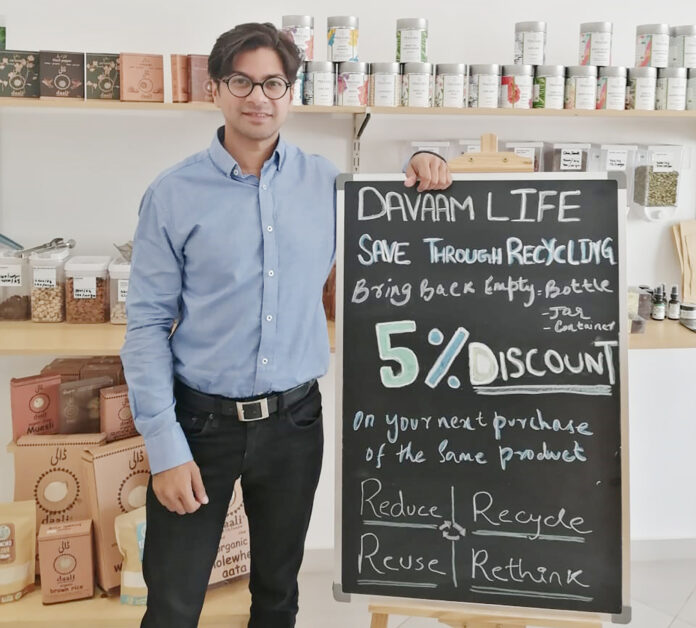





This is an excellent venture. Most impressed. Will forward this article to all my groups. Definitely visiting your outlet. May you achieve Successful in all endeavours.